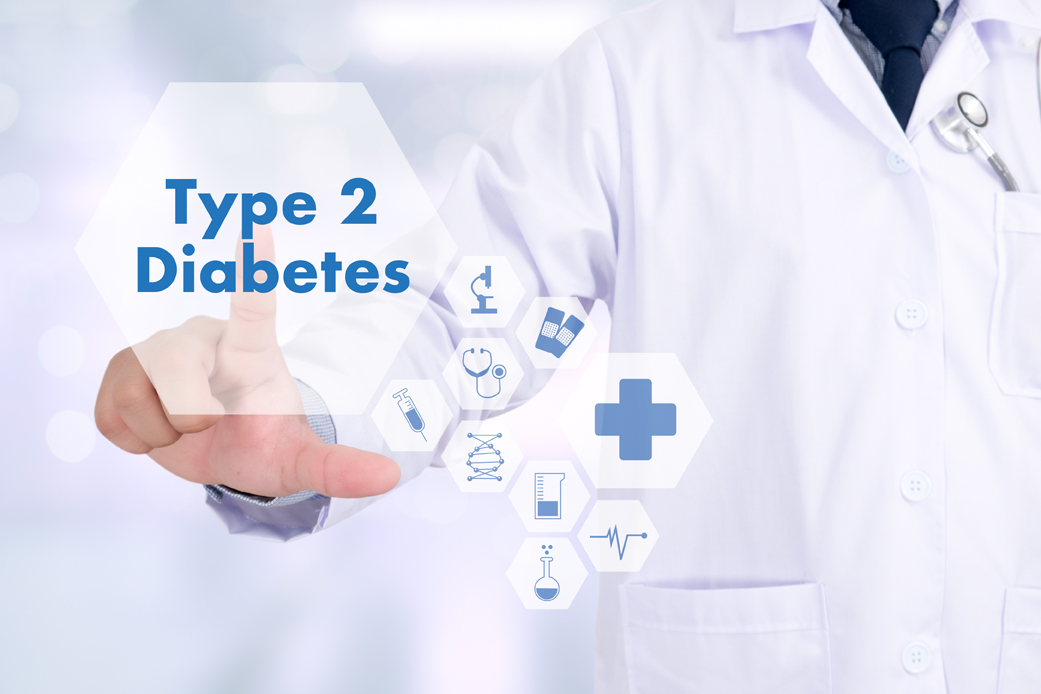What Causes Type 2 Diabetes?

Diabetes is a malfunction of the metabolic system, which means the body is unable to process glucose (e.g., sugar) correctly. In a nondiabetic person, the peptide hormone called insulin metabolizes carbohydrates, fats and proteins. Those with type 2 diabetes struggle with elevated blood sugar levels because the pancreas either produces too little or no insulin or it resists insulin. Glucose builds up in the blood as a result.
Signs and symptoms of type 2 diabetes
Signs and symptoms of type 2 diabetes often develop slowly, which means you can have it and not realize it for years. That’s why it’s so important to get regular health screenings. When signs and symptoms are present, they include:
- Increased thirst
- Frequent urination
- Increased hunger
- Unintended weight loss
- Fatigue
- Blurred vision
- Slow-healing sores
- Frequent infections
- Numbness or tingling in the hands or feet
- Areas of darkened skin, typically near the armpits and neck
Common risk factors of type 2 diabetes
According to the American Society for Metabolic and Bariatric Surgery obesity, which is defined as a body mass index of (BMI) of 30 or more, is a major independent risk factor for developing type 2 diabetes. Approximately 90% of people with type 2 diabetes have obesity or are overweight. It is the main risk for type 2 diabetes.
Additional risk factors include:
- Fat distribution
Men and women who carry excess weight in their abdomen have an increased risk of type 2 diabetes. The abdominal cavity stores visceral or active fat around a number of important internal organs like the liver, pancreas and intestines. When these organs are compromised by excess fat, they are unable to function properly. - Inactivity
The less active you are, the higher your risk. Physical activity helps control your weight and expends glucose as energy and makes your cells more sensitive to insulin. - Family history
The risk of type 2 diabetes increases if an immediate family member (e.g., parent or sibling) has type 2 diabetes. - Blood lipid levels
Low levels of HDL, the good cholesterol, and high triglycerides (fats) are associated with a higher risk of type 2 diabetes. - Age
The risk of type 2 diabetes increases with age, especially after age 45. - Prediabetes
If your doctor has diagnosed you with prediabetes, that means your blood glucose levels are higher than normal, but not high enough to be classified as diabetes. If left untreated or unmanaged, it can often progress into type 2 diabetes. - Gestational diabetes during pregnancy
Women with gestational diabetes have an increased risk of developing type 2 diabetes later in life. Women who gave birth to a baby over 9 pounds are also in a higher risk category with or without gestational diabetes. - Polycystic ovary syndrome (PCOS)
PCOS is a common condition that increases the risk of type 2 diabetes and is characterized by irregular menstrual cycles, excess hair growth and obesity. - Areas of darkened skin around the armpits and neck
This is a visual cue of insulin resistance and should be checked by a medical professional, as it may increase your risk of type 2 diabetes.
Treatment options for type 2 diabetes
If you’ve tried everything to lose weight, lower your cholesterol and regulate your blood sugar levels on your own or with medication but nothing has worked, it’s time to talk to the metabolic specialists at Beltre Bariatric. Once we understand your unique situation, we can help address your metabolic syndrome and type 2 diabetes with safe, effective laparoscopic metabolic surgical options, which include:
- Sleeve gastrectomy
A sleeve gastrectomy is a surgical weight-loss procedure that removes a portion of the stomach to reduce its size and capacity. This procedure helps people lose weight by restricting the amount of food they can consume at a time. - Gastric bypass
A gastric bypass surgery divides the stomach into an upper and much larger lower pouch. The intestines are then rearranged to connect to both. This helps people lose weight by changing how the stomach and small intestine handle the food you eat.
These metabolic procedures cause your body to release hormones like, glucagon-like peptide 1 (GLP-1), which help stop type 2 diabetes in days after the surgery.
If you’re ready to take back your life, lose the weight and treat your type 2 diabetes, call Beltre Bariatrics and schedule a consultation. Dr. Wiljon Beltre is a board-certified bariatric surgeon who specializes in minimally invasive, advanced surgical techniques to help heal your body and improve longevity.

Are You a Candidate for Weight Loss Surgery?
Take our 60 second assessment and find out if you are a candidate for weight loss surgery


